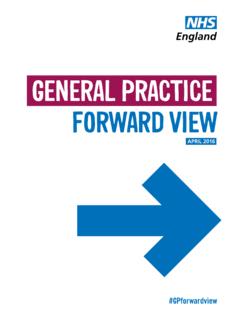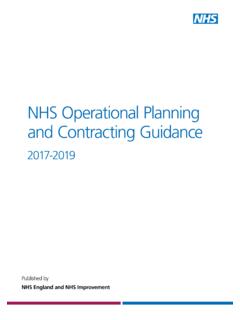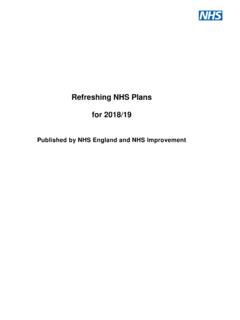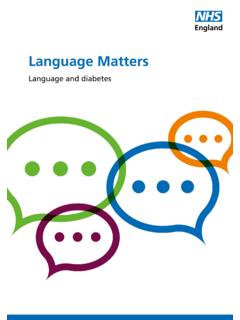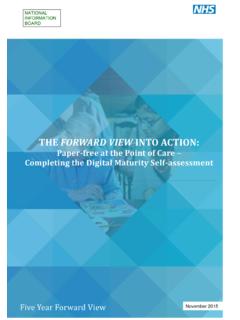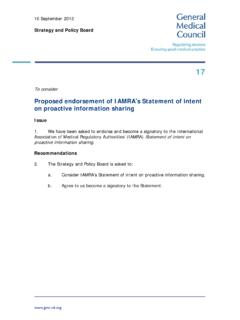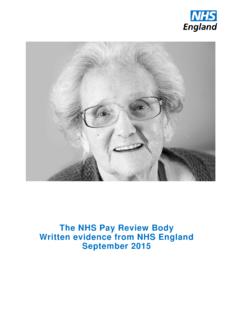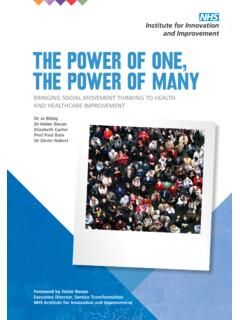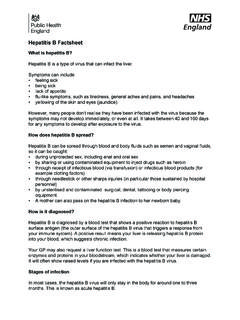Transcription of Making Every Contact Count (MECC): Consensus statement
1 Making Every Contact Count (MECC): Consensus statement Produced by Public Health England, NHS England and Health Education England, with the support of partner organisations identified below April 2016 Making Every Contact Count : Consensus statement 2 About Public Health England Public Health England exists to protect and improve the nation's health and wellbeing, and reduce health inequalities. It does this through world-class science, knowledge and intelligence, advocacy, partnerships and the delivery of specialist public health services. PHE is an operationally autonomous executive agency of the Department of Health. Public Health England, Wellington House, 133-155 Waterloo Road, London SE1 8UG Tel: 020 7654 8000 Twitter: @PHE_uk Facebook: About NHS England NHS England leads the NHS in England.
2 It sets the priorities and direction of the NHS and encourage and inform the national debate to improve health and care. It wants everyone to have greater control of their health and their wellbeing, and to be supported to live longer, healthier lives by high quality health and care services that are compassionate, inclusive and constantly-improving. NHS England, Quarry House, Quarry Hill, Leeds LS2 7UA Twitter:@NHSE ngland Email: Developed by: Public Health England (PHE), NHS England, Health Education England (HEE) and the national MECC advisory group. Lead authors: Mandy Harling (Public Health England) and Katrina Stephens (NHS England). For queries on this document, Contact : Throughout the development of the policies and processes cited in this document, we have.
3 Given due regard to the need to eliminate discrimination, harassment and victimisation, to advance equality of opportunity, and to foster good relations between people who share a relevant protected characteristic (as cited under the Equality Act 2010) and those who do not share it given regard to the need to reduce inequalities between patients in access to, and outcomes from healthcare services and to ensure services are provided in an integrated way where this might reduce health inequalities Crown copyright 2016 You may re-use this information (excluding logos) free of charge in any format or medium, under the terms of the Open Government Licence To view this licence, visit OGL or email Where we have identified any third party copyright information you will need to obtain permission from the copyright holders concerned.
4 Making Every Contact Count : Consensus statement 3 This information can be made available in alternative formats, such as easy read or large print, and may be available in alternative languages, upon request. Please Contact 0300 311 22 33 or email Published April 2016 PHE publications gateway number: 2015760 NHS England publications gateway number: 05086 Public Health England is a member of: Making Every Contact Count : Consensus statement 4 Contents About Public Health England 2 About NHS England 2 Headline Consensus message 5 1. Introduction 6 Examples of local impact 6 2. Our shared definition of MECC 7 Core MECC definition 7 Broader MECC definition (MECC Plus) 7 3. Our shared purpose 8 Physical health and wellbeing 9 Clustered risk factors 9 Mental health and wellbeing 11 MECC: Behaviour change principles 11 Health inequalities and the benefits of MECC 12 4.
5 Our context for supporting behaviour change 13 5. The evidence base for MECC 14 MECC model 15 6. Why we support the MECC approach; the benefits of MECC 16 Evidence of effectiveness 16 Our support for strengthening the evidence base 16 7. Conclusion 17 8. Our commitments 17 9. List of partners 18 10. Relevant resources 18 Making Every Contact Count : Consensus statement 5 Headline Consensus message This Consensus statement describes the commitment of the organisations signed below to work together to maximise support for population behaviour change, and help individuals and communities significantly reduce their risk of disease. Many long-term diseases affecting our population are closely linked to known behavioural risk factors, with 40% of the UK s disability adjusted life years lost being attributable to tobacco, hypertension, alcohol, being overweight or being physically inactive1.
6 The signatories of this statement recommend that the evidence-based Making Every Contact Count approach should be applied across all health and social care organisations, and it describes our commitments to support organisations adopting the MECC approach. This statement has been developed by the undersigned national organisations to provide clarity on what is meant by MECC, to highlight the evidence base, and to illustrate the population and workforce benefits of this behaviour change approach. It is intended to provide the basis for organisational action and the adoption of the MECC approach within the NHS, local authorities, the allied and wider health and care workforce, and relevant agencies; as an essential contribution to the prevention agenda, and as part of our commitment to work collaboratively to improve the health of our population.
7 Please note this document uses recent evidence on population health and behaviour change, but does not include a systematic review of the evidence. 1 Newton JN, et al (2015) Changes in health in England, with analysis by English regions and areas of deprivation, 1990 2013: a systematic analysis for the Global Burden of Disease Study 2013; Public Health England. Lancet 2015; 386: 2257 7 4 Making Every Contact Count : Consensus statement 6 1. Introduction Making Every Contact Count (MECC) is an approach to behaviour change that uses the millions of day-to-day interactions that organisations and people have with other people to support them in Making positive changes to their physical and mental health and wellbeing. MECC enables the opportunistic delivery of consistent and concise healthy lifestyle information and enables individuals to engage in conversations about their health at scale across organisations and populations.
8 Drawing on behaviour change evidence2, MECC maximises the opportunity within routine health and care interactions for a brief or very brief discussion on health or wellbeing factors to take place. A MECC interaction takes a matter of minutes and is not intended to add to the busy workloads of health, care and the wider workforce staff, rather it is structured to fit into and complement existing professional clinical, care and social engagement approaches. Evidence suggests that the broad adoption of the MECC approach by people and organisations across health and care could potentially have a significant impact on the health of our population. Examples of local impact MECC is an effective and evidence-based approach. Birmingham Children s Hospital, for example, has trained over 120 staff using MECC and saw benefits that included staff having conversations about their own health, increased demand and uptake of lifestyle services by staff and an increasing number of referrals to external lifestyle services3.
9 Within community pharmacy, there are now over 3,500 qualified health champions working in over 2100 Healthy Living Pharmacies4 who are engaging members of the public, by using Every interaction as an opportunity for a health promoting intervention, Making Every Contact Count . With local authorities having statutory responsibility for public health a wide range of partners and frontline services are becoming engaged in core MECC delivery; ranging from allied health and social services to fire and rescue and housing services. Staffordshire County Council s MECC delivery work with the local Fire Service demonstrates the benefits of this broader reach. 2 Michie, S. et al, (2011) The behaviour change wheel: A new method for characterising and designing behaviour change interventions, Implementation Science 20116:42 3 Health Education West Midlands (2013) Making Every Contact Count examples from practice 4 Making Every Contact Count : Consensus statement 7 2.
10 Our shared definition of MECC Core MECC definition MECC is an approach to behaviour change that uses the millions of day-to-day interactions that organisations and individuals have with other people to support them in Making positive changes to their physical and mental health and wellbeing. MECC supports the opportunistic delivery of consistent and concise healthy lifestyle information and enables individuals to engage in conversations about their health at scale across organisations and populations: for organisations, MECC means providing their staff with the leadership, environment, training and information that they need to deliver the MECC approach for staff, MECC means having the competence and confidence to deliver healthy lifestyle messages, to help encourage people to change their behaviour and to direct them to local services that can support them for individuals, MECC means seeking support and taking action to improve their own lifestyle by eating well, maintaining a healthy weight, drinking alcohol sensibly, exercising regularly, not smoking and looking after their wellbeing and mental health This definition of MECC has been agreed by a number of organisations listed at the end of this document.
